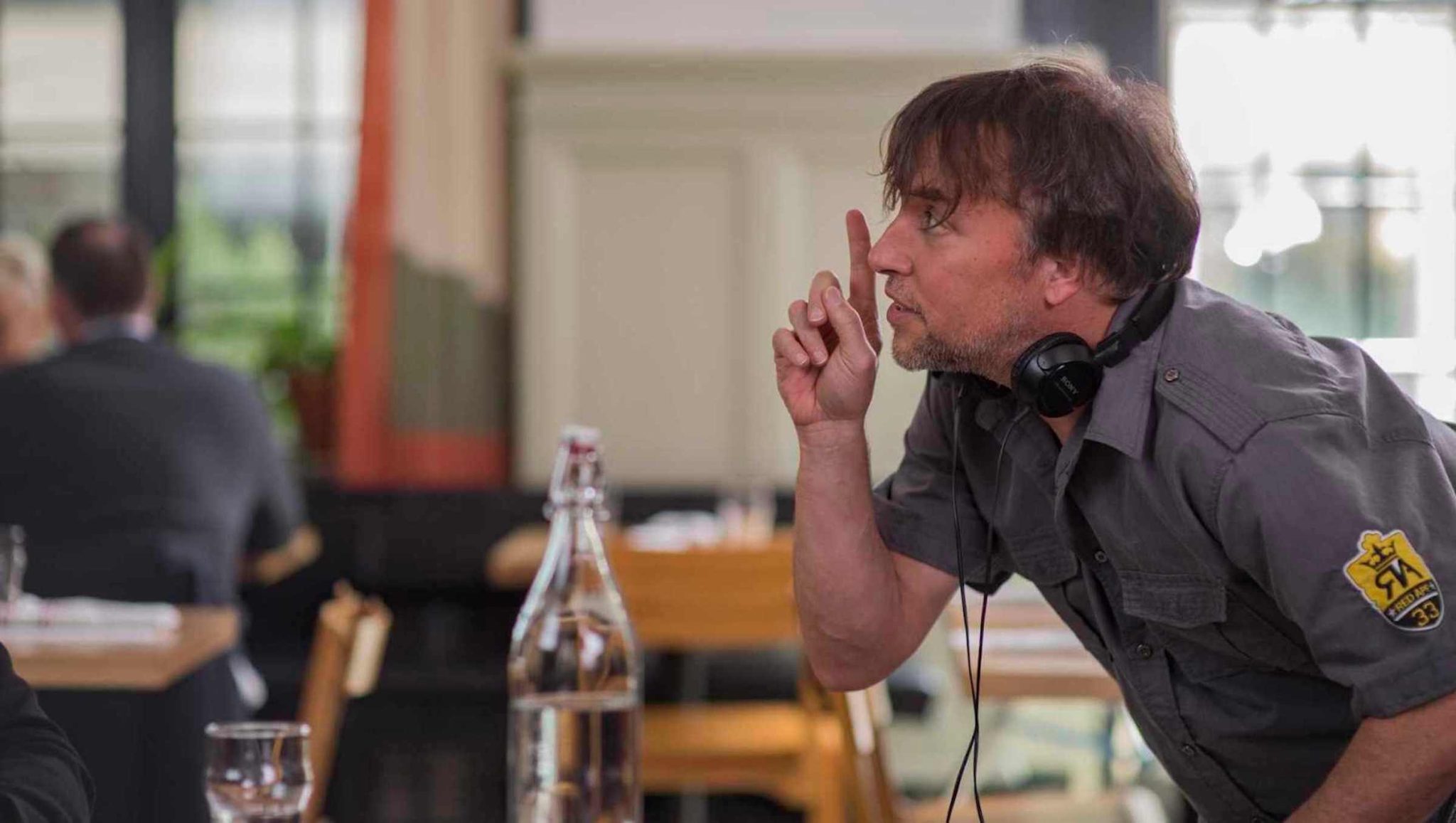5 Storytelling Lessons from Pulitzer Prize-winning Jules Feiffer

More than his success across different fields, aging has taught Jules Feiffer how storytelling evolves.
The Pulitzer Prize-winning editorial cartoonist, playwright, and screenwriter recently spoke before a live audience at the Bay Street Theater & Sag Harbor Center for the Arts in New York, recorded for the To Live & Dialogue in LA podcast. Screenwriter Aaron Tracy (TV’s Sequestered) hosts the podcast, sponsored by ScreenCraft.
“The limitations of age made me fool around with new forms,” said Feiffer, who has written more than thirty stage plays, screenplays (Carnal Knowledge, Popeye), and books, including a graphic novel mystery-romance (Kill My Mother) when he was 85. “That became the game I played with myself, and it’s a great game to play when you’re in your mid-eighties and there are so many limitations. There are things you can’t do. And instead of closing doors, it opened them. It gave me new things to do that I’d never thought of before.”
Readers of a certain age remember Feiffer as a cultural force from the 1950s through 1980s, with nationally syndicated cartoons from The Village Voice that tackled topics such as sex, relationships and politics with groundbreaking frankness. (His artwork was equally at home in children’s books, such as the humorous classic The Phantom Tollbooth.) In addition to the Pulitzer, Feiffer’s accolades include an Academy Award for the 1961 short film Munro and a Lifetime Achievement Award from the Writers Guild of America.
Here, Feiffer talked largely about 1971’s Carnal Knowledge, directed by Mike Nichols (The Graduate). The film stars Jack Nicholson and Art Garfunkel as two longtime friends whose skewed views of women impact their relationships, notably with costars Ann-Margret and Candice Bergen.
“It did what I try to do through my career, which was to tell an audience what they always knew, but they weren’t talking about,” Feiffer said. “It wasn’t about sex. It was about how we lived.”
Here are five thoughts we gleaned from Feiffer about collaboration, inspiration, and sustaining a creative drive. (Listen to the podcast in its entirety here.)
1. Dive beneath the surface.
Feiffer didn’t draw on specific people when writing Carnal Knowledge as much as probe societal attitudes. The women’s movement generated a lot of press about how “relationships were getting so much better between men and women; there was more understanding, there was more this, and we would that, and I didn't see any of that reflected in the real world,” he said.
He recalled being on tour and how one college student told him how much she enjoyed talking with him, saying she couldn’t talk that way with anyone else. “I said, ‘Why not?’ and she said, ‘Because if men get the feeling that you’re smart, if you're smarter than they are, or if you’re very smart, they get threatened.’ And my heart broke because the best part of this young woman and other young women I met was the conversations. As attractive as they were, the conversations were terrific and they were so interesting, and they dared not show that to the men they were dating.”
2. Take your audience on an emotional journey.
Feiffer wanted Carnal Knowledge to be a “cautionary fable” through some dark and angry material, so it had to begin in a lighter place. “I wanted it to start with the kind of innocent playfulness that an audience would find charming between young men and women. This is the way we all are, and this is … the cuteness,” he said. As Garfunkel’s and Nicholson’s characters age, “[Nicholson] gets darker and darker, and as they get older, that guy [Nicholson] stays the same. The conversation barely changes, but it’s not as funny anymore. It’s not as innocent anymore.”
Learn how to write great movie dialogue with this free guide.
3. Treat criticism like judo—i.e., be gentle in your defense.
One scene in Carnal Knowledge shows Nicholson’s character screaming abusively at a woman, which Nichols at first thought would alienate viewers.
“Mike called me into his office … and said, ‘I don’t think we can shoot this scene. … It’s too ugly. It’s too cruel. We’re going to lose the audience. We’ll never get them back,’” Feiffer said.
“And by that time, I had worked with Nichols long enough on this film to trust him and to trust his reactions. I also understood something about judo: that if I argued with him, I would just get him to stay harder with his own argument. But if I just listened and shut up and let him talk…”
Nichols talked about the scene all the way to a restaurant. “I just listened; I made some cursory comments but nothing very much, and by the time we get to the restaurant and pulled over, he said, ‘No, I guess we have to shoot it because that's what would happen.’”
4. Your stories change, just like you do.
Tracy noted in the podcast intro that he’s interpreted Carnal Knowledge differently over time. “When I was younger, I saw it as a study of friendship, you know, not such a good friendship but a friendship nonetheless. Later, I saw it as a study of misogyny and how people really wound each other in relationships.”
Feiffer alluded to similar changes, recalling how he and Nichols chatted at a screening of the film during a New York Museum of Modern Art retrospective of Nichols’s work. “I said to Mike, ‘I could never have written this film today. I’m a different person.’ He said, ‘I could never have directed it.’ …
“When I was young, I was much more— I used to be angry all the time. And for many years, I was in a rage, and I exhibited a lot of that rage on the paper, and it worked. But somewhere along the way—I don’t know how to tell you this—I got happy,” Feiffer said. “I can’t do that rage thing so much anymore.”
5. When your work is play, you never feel limited.
Feiffer, now 90, knows he can’t write for the theater anymore because of his hearing issues, but that doesn’t mean he can’t create. “I have very expensive hearing aids, which in most rooms don’t help at all. Anybody with hearing aids knows what I’m talking about. And I can’t walk. You know, I walk at a snail’s pace,” he said. “But I have the good fortune to make a wonderful marriage and move out to Shelter Island and be in an environment [that] gave me the pleasure of playing, and work has always been a different form of playfully [finding] out what I really could do.”
Listen to the podcast on iTunes here.
 Valerie Kalfrin is an award-winning crime journalist turned essayist, film critic, screenwriter, and emerging script consultant. She writes for The Hollywood Reporter, CC2K, Script magazine, The Guardian, Film Racket, Bright Wall/Dark Room, ScreenCraft and other outlets. A member of Screenwriters of Tomorrow and the Tampa Bay Film Society, she’s available for story consultation, script editing, coverage, and collaboration. Find her at valeriekalfrin.com or on Twitter @valeriekalfrin.
Valerie Kalfrin is an award-winning crime journalist turned essayist, film critic, screenwriter, and emerging script consultant. She writes for The Hollywood Reporter, CC2K, Script magazine, The Guardian, Film Racket, Bright Wall/Dark Room, ScreenCraft and other outlets. A member of Screenwriters of Tomorrow and the Tampa Bay Film Society, she’s available for story consultation, script editing, coverage, and collaboration. Find her at valeriekalfrin.com or on Twitter @valeriekalfrin.
Photo credit: Guild Hall
For all the latest ScreenCraft news and updates, follow us on Twitter, Instagram and Facebook!
Get Our Screenwriting Newsletter!
Get weekly writing inspiration delivered to your inbox - including industry news, popular articles, and more!


























